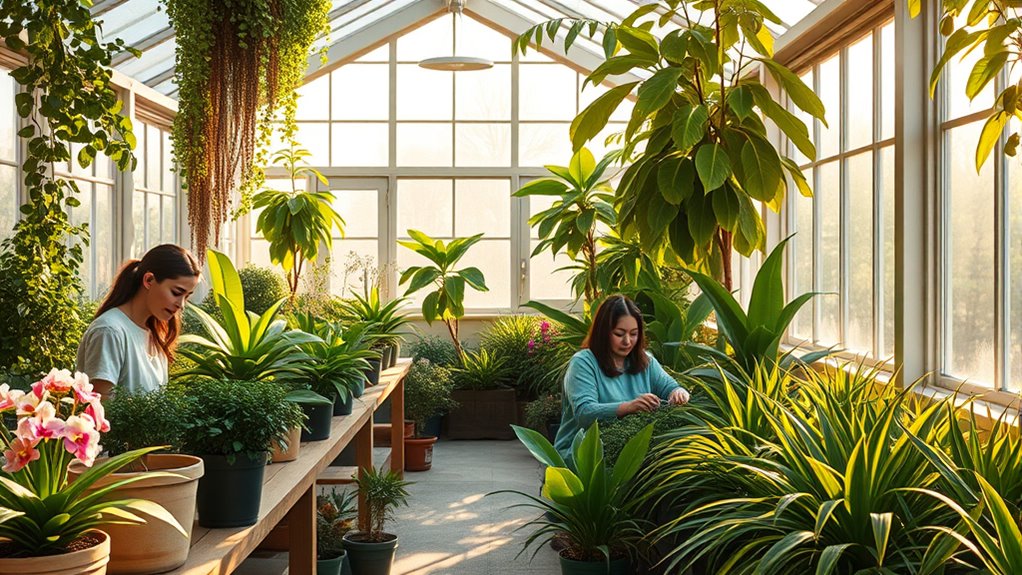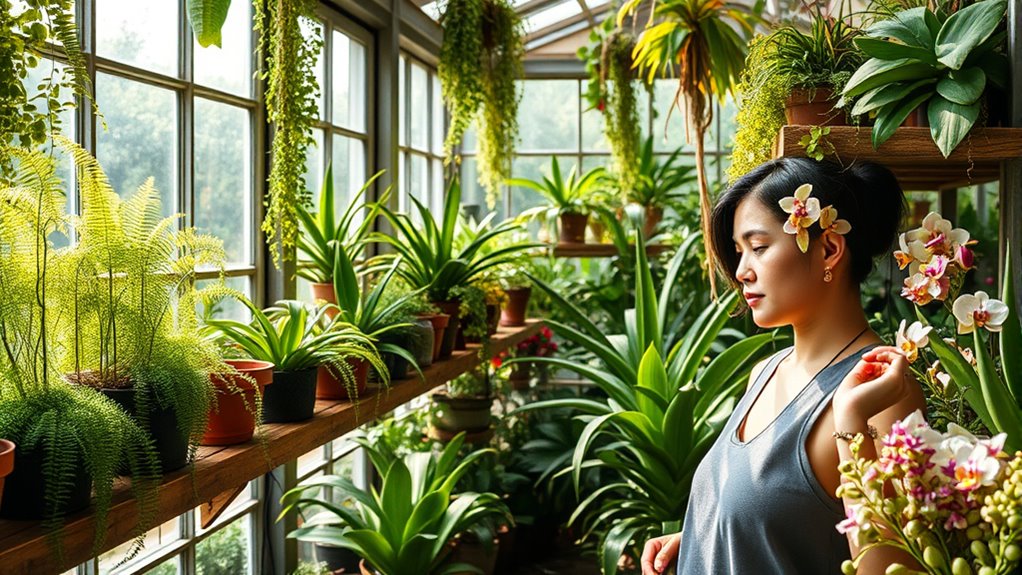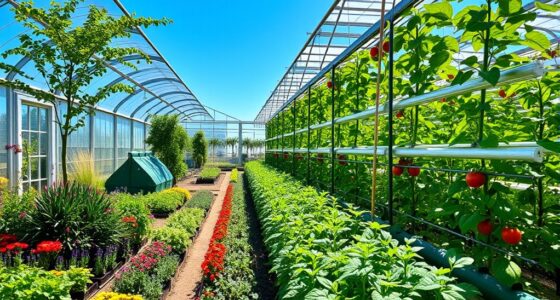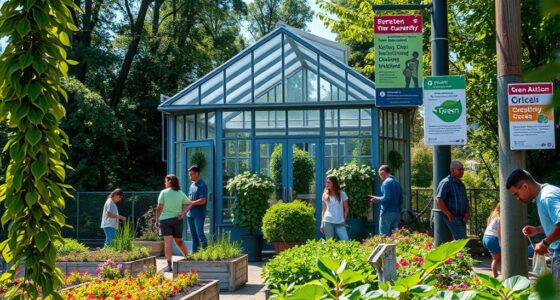Horticulture therapy, especially in greenhouses, helps heal your mind and body by engaging you with nurturing plants that reduce stress and boost mood. Working with greenery fosters a sense of calm, improves mental focus, and offers physical movement that benefits overall health. It reconnects you with nature and creates a peaceful environment indoors. If you want to explore how these natural spaces can transform your well-being, there’s plenty more to discover.
Key Takeaways
- Greenhouses create controlled environments that facilitate therapeutic activities, enhancing mental well-being and reducing stress.
- Engaging in greenhouse gardening boosts mood, fosters mindfulness, and provides a sense of accomplishment.
- The physical activities involved improve movement, air quality, and sensory engagement, supporting physical health.
- Greenhouses offer a safe space for social interaction, community building, and shared learning experiences.
- Connecting with plants in a greenhouse helps individuals reconnect with nature, promoting emotional stability and relaxation.

Have you ever experienced the calming effect of working with plants? If you haven’t, you’re missing out on a simple yet powerful way to boost your mental and physical well-being. Indoor gardening offers an accessible entry point into the world of therapeutic horticulture, allowing you to create a green sanctuary right inside your home. When you care for houseplants, you engage in a form of therapeutic horticulture that reduces stress, lifts your mood, and even improves focus. The act of tending to plants isn’t just about aesthetics; it’s about nurturing a living thing, which can foster a sense of accomplishment and purpose. Whether you’re watering, pruning, or arranging, these small routines help ground you in the present moment, providing relief from anxiety and mental fatigue.
Caring for houseplants reduces stress, boosts mood, and promotes mindfulness in simple, nurturing routines.
Indoor gardening doesn’t require a large outdoor space; it’s adaptable to your environment and schedule. You can start with a few low-maintenance plants like succulents or pothos, which thrive indoors and require minimal care. As you develop your skills, you might experiment with more complex arrangements or even grow herbs and vegetables in small containers. The process of planting and caring for these greenery elements becomes a form of therapeutic horticulture, promoting mindfulness and emotional stability. It’s a way to reconnect with nature, even if you live in a bustling city or a compact apartment. This connection not only enhances your physical surroundings but also nurtures your mental health, providing a peaceful retreat from daily stressors.
Engaging in indoor gardening as a part of therapeutic horticulture can also improve your physical health. It encourages gentle movement, improves air quality, and can even motivate you to spend more time in natural light. For example, choosing energy-efficient ceiling fans can help circulate air and maintain a comfortable environment for your plants and yourself. The sensory experience of touching soil, smelling fresh leaves, and observing growth stimulates your senses and helps regulate your mood. Over time, caring for indoor plants can become a routine that offers stability and a sense of control—valuable benefits when life feels overwhelming. Additionally, this activity can foster social connections, whether through sharing tips with friends or joining online gardening communities, reinforcing the positive effects on your mental health.
In essence, indoor gardening and therapeutic horticulture serve as accessible tools to heal and nurture both your mind and body. By cultivating plants indoors, you create a personal oasis that fosters calm, focus, and resilience. It’s a simple act that yields profound benefits, reminding you that sometimes, the best therapy comes from something as straightforward as caring for a plant. So go ahead, pick out a few plants, and start reaping the mental and physical rewards that come with tending your green space at home.
Frequently Asked Questions
What Are the Long-Term Mental Health Benefits of Greenhouse Horticulture Therapy?
You might wonder about the long-term mental health benefits of greenhouse horticulture therapy. Engaging in plant therapy helps you build emotional resilience over time, reducing stress and anxiety. As you nurture plants, you develop a sense of accomplishment and calm. This consistent connection with nature fosters lasting emotional stability, improves patience, and encourages mindfulness. Ultimately, greenhouse horticulture therapy offers ongoing mental health support, helping you maintain a balanced, healthy mind in the long run.
How Accessible Are Greenhouse Therapy Programs for Different Age Groups?
You might wonder about the accessibility of greenhouse therapy programs across age groups. While many programs aim to be inclusive, accessibility barriers like mobility issues, transportation, and cost can limit participation. Age-specific programs are designed to address these challenges, ensuring tailored activities for children, adults, and seniors. By focusing on these adaptations, greenhouse therapy can become more accessible, helping more people experience its mental and physical health benefits regardless of age.
Can Horticulture Therapy Be Customized for Specific Physical Disabilities?
You can definitely customize horticulture therapy for specific physical disabilities by using adaptive techniques and personalized plans. By evaluating individual needs, you can incorporate tools like raised beds or ergonomic tools, making gardening accessible. This tailored approach ensures that each person benefits from the therapy, promoting healing and well-being. Your goal should be to modify activities so everyone can participate comfortably and safely, regardless of their physical limitations.
What Are the Costs Involved in Setting up a Greenhouse Therapy Program?
When setting up a greenhouse therapy program, you should consider initial setup costs like purchasing land, building the greenhouse, and equipment. Ongoing maintenance expenses, including utilities, plant supplies, and staff, also impact your budget. Costs vary depending on size and complexity. Planning carefully helps you allocate funds effectively, ensuring your program remains sustainable and effective in providing therapeutic benefits.
How Does Climate Impact the Effectiveness of Horticulture Therapy Sessions?
Think of climate as the heartbeat of your garden sessions, guiding their rhythm. Seasonal variations shift sunlight and temperature, influencing plant growth and healing energy. An indoor climate, if well-controlled, acts like a gentle breeze, ensuring consistent comfort regardless of outside conditions. By maintaining a stable environment, you help your clients connect with nature’s healing power, making every session a steady, nurturing journey through growth and renewal.
Conclusion
As you step into the world of horticulture therapy, you’ll discover it’s like a gentle balm for your mind and body. Just as a garden blooms with life, your well-being flourishes amid green leaves and vibrant blossoms. Embrace this healing power, knowing that nurturing plants can nurture you in return. With each visit to the greenhouse, you cultivate not only plants but also a healthier, happier you—proof that nature truly is the best medicine.









